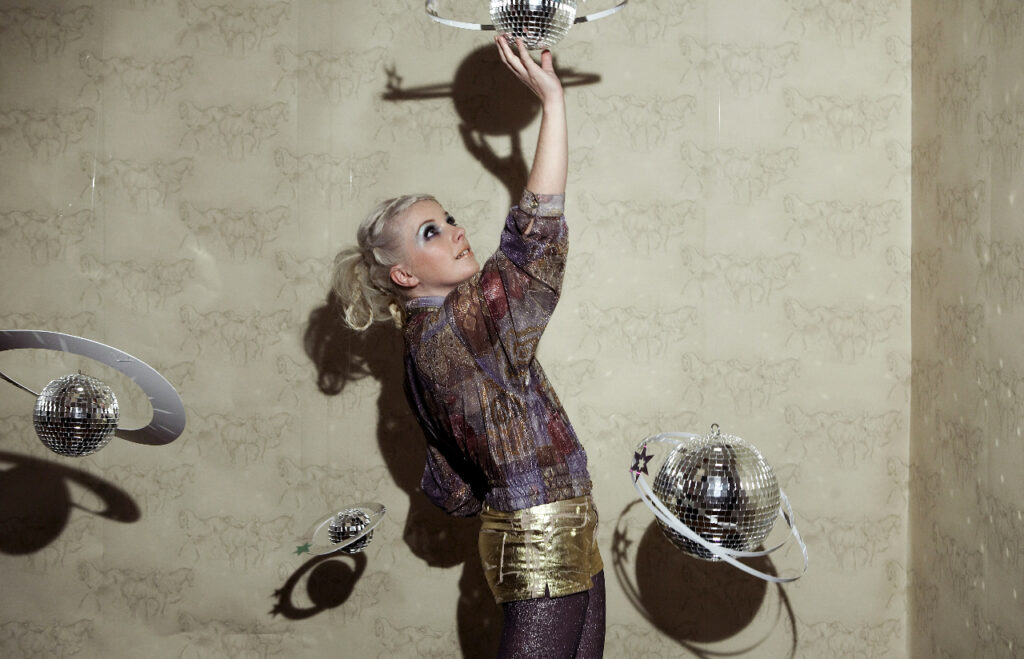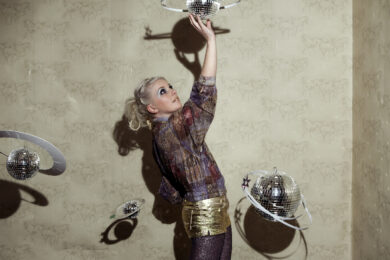It’s In The City 2008 — the new band jamboree in Manchester. It’s the usual round of skinny jeaned indie boy band hopefuls with their variants on the three chord shuffle with just enough difference to justify some stage space and hopes of conquering an inch of territory just to the side of Pete Doherty. The indie world is congested.
It’s in this context that the homespun glamour of Little Boots makes sense. Her gig is a rare moment of pop flash and bedsit glamour. Hidden behind of a bank of keyboards playing to 25 people makes sense. The songs are instantly catchy and she plays pop in a small room but it’s the kind of pop that usually relies on massive stadiums and hi tech backdrops and it is getting executed right here in a dingy cellar. And working. She has an innate northern melancholia that makes her music resonate with a soulfulness in the same way that New Order did.
She has the star thing nailed down. Her tunes glisten with keyboards and precise melodies. This is pop with a knowing intelligence and breadth of vision ticking away just below the surface. Little Boots seems to have arrived fully formed in the midst of the new band cattle market and is destined for escape.
And she is from Blackpool, which in my book makes her double interesting — that being the town where I grew up and learned how to be in band. I instinctively understand all the frustrations and the influences of growing up in the town — the ‘Tatty Seaside Town’ we once sung about in my band the Membranes and the most misunderstood town in Britain.
Months later Little Boots is the hippest name in pop and is wisely tipped by experts everywhere to be the sensation of the year.
Pop in 2009 moves fast.
"I guess things seem to have happened quicker than they actually have. In reality things actually developed gradually although it didn’t seem like that! I feel the pressure but not in an ‘Oh my god!’ running around every day sort of pressure. I have just got to focus on what I’m doing and not worry about what other people are thinking about what I should be doing."
Little Boots AKA Victoria Hesketh hails from Blackpool. This town is like the anti-Brighton; the opposite to a city which constantly gets pats on the back from the media who live in glorious semi-retirement on the south coast. Completely unlike its northern counterpart which is sneered at for being tacky and wind-blasted.
However it remains the UK’s number one tourist attraction and this season has seen its best crowds for two decades. There is a strange and twisted beauty to the place, a rakish mash up of concrete and neon that out of season has a desolate and wild charm. Blackpool can be rough and dark but it can also be boisterous and fun in a way that terifies Guardian luvvies. It’s also a big place where most of the residents have little interaction with the holiday part of town.
These very contradictions fired up the young singer
"Blackpool’s history of being an entertainment town is quite fascinating and at the same time it’s also run down and there was quite a contradiction between the two worlds. There were not many musical opportunities there. If you wanted to do anything different you had to go somewhere else but I guess that’s the same with any small town. Blackpool is not a terrible place and lots of interviews I’ve done somehow make it out to be that. Blackpool is different obviously but most small places don’t have opportunities like cities do."
Victoria comes from the suburban sprawl that sprouts out of the north end of Blackpool — the endless red brick semis and proud gardens. She grew up in Thornton Cleveleys where I grew up twenty-five years previously. Little has changed round there — the average age of the residents has come down a bit and the magic mushroom punk/hippie scene that used to exist covertly in back rooms and the few mouldy bedsits in Cleveley Town Centre has gone. But it is where Britain’s best young pop star started to dream a very different dream
"I went to Manchester a lot at weekends to watch gigs at the Apollo and the Uni and would see stuff like the Foo Fighters — I used to be a lot more into rock when I was younger, it was what my friends were into. When I grew up I was into pop music like Kylie Minogue and Take That. When I was 15 I went clubbing, dancing to mainstream dance music in my late teens. I got into rock bands, then into jazz bands. I’ve always been a varied person into different styles of music. I love music as long as its good songs- from rock bands to jazz to pop.
"I was in proggy bands, indie band, punk bands and did covers. Typical stuff that you do at 16 messing round in college."
This is the same college that I went to as well. Blackpool Collegiate. In the 21st century it offers one of the best music courses in the UK in a specially built centre. In the early 80s music was frowned upon and actively discouraged. Now I go back every year and give a lecture on music and judge their battle of the bands competition which is always at a great standard.
Back then I was expelled for doing pretty much what I’m doing now — things have moved on.
"Blackpool music college was great and a really big influence on me. They have a music tech course that is really good. I then went to Uni in Leeds. I was in an indie band, Dead Disco playing synth."
Indie’s loss was destined to be pop’s gain however.
"Chris Lowe talks about Blackpool whilst Robert Smith from Cure has not much memory of it because he left when he was six. Chris Lowe mentioned it at the Brits recently which was massive", she says proudly, adding, "Millions of people were watching. Not that many musicians have come from Blackpool, you have got to be quite motivated to go out and do it. I’m certainly not embarrassed about coming from Blackpool, some people have picked up on way I said it was dark and run down but I’m also quite positive about it saying it’s quite kitsch and a strange cultural melting pot — I’m fascinated by the way it is a seaside town based on entertainment and also quite run down but also northern and cold; there’s a lot of contradictions. It’s quite a special place and in interviews people pick up on the dark side too much- everywhere has got good bits and bad bits. . . ."
It was in Leeds where she made her first serious musical steps when she joined Dead Disco. They became briefly hip in the wake of the Kaiser Chiefs and the mini Leeds scene and released three singles. Dead Disco fell apart when they decamped to Los Angeles in 2007 for writing sessions. Victoria left, suffocated by the three way writing split in the band and its change of musical direction and became Little Boots named after the Roman Emporer Caligula.
Within months she hit the internet with a series of bedroom YouTube cover versions and soon began writing her own music.
Her original demo was picked up by Hot Chip’s Joe Goddard who then produced her initial single ‘Stuck On Repeat’.
"It’s difficult to play keyboards and perform. I cut down on the keyboards so I could concentrate on mainly singing and fronting the whole thing. It’s more of a pop thing now and I think it’s important if you are watching you need commitment from the singer. You need that connection from the vocalist. I’m totally fine with that, when I was stood behind the keyboard there was a barrier between me and the crowd."
Little Boots will transcend the hype and become another homegrown star in what’s shaping up to being a remarkable year for British music. Clouded by the talk of the end of the music business there has been an explosion of diverse talent and Little Boots has the talent and striking image to pull off this pop star thing which is good for her and good for Blackpool — the tatty Seaside Town could well do with that confidence boost.



